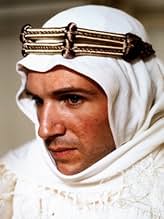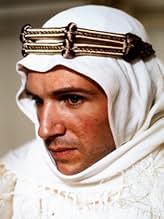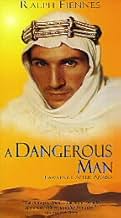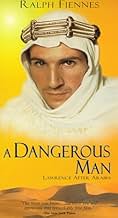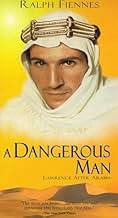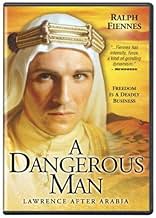Ajouter une intrigue dans votre langueLawrence and Feisal go to argue for Arab independence at the 1919 Paris Peace Conference.Lawrence and Feisal go to argue for Arab independence at the 1919 Paris Peace Conference.Lawrence and Feisal go to argue for Arab independence at the 1919 Paris Peace Conference.
- Réalisation
- Scénario
- Casting principal
Alexander Siddig
- Feisal
- (as Siddig El Fadil)
Avis à la une
I have seen the film again, read the other reviews and I too consider this movie excellent in its own right, the stars are spot on and the acting very believable. It is a definite companion piece to Lean's "Lawrence of Arabia", I have the 2 DVDs side by side in my collection at home. It might not have the trainwrecks and the battles with the Turks, but the politics of the time are very important, also very interesting, emphasised more strongly in this film than "Lawrence of Arabia". History buffs will lean toward this film I feel, as I have done. You will not even notice it was made for TV, the story is so gripping. Ralph Fiennes is remarkable in the role of T.E.Lawrence, working as translator and for the Arab cause, King Feisal perfectly portrayed by the young actor Alexander Siddiq, the others the politicians including Michael Cochrane as Winston Churchill are first rate, Nicholas Jones as Lord Dyson is chilling. To sum up, extremely good, an important and interesting film (not dry as someone said, the translation scenes, the speeches for world leaders had me on the edge of my seat) One has to look back at history to understand what is going on today. In the main, all the historical facts are in place here, and therefore one can at least, partially understand the complex situation in the region in our present age as we tune in to the News. Comment from Malcolm in Toronto, May 27th 2007
The great Lawrence of Arabia fights side-by-side with the Arabs to help save Arabia from Turkish invaders. Fade to black. Roll credits. End of story.
Well, not entirely. A Dangerous Man: Lawrence After Arabia, tells more. In this movie, T.E. Lawrence (Ralph Fiennes) goes to Paris with Feisal (Alexander Siddig) to argue for Arab independent rule during the 1919 Paris Peace Conference. In Paris, instead of the shifting sands of the desert, Feisal and Lawrence encounter shifting political alliances.
If you're interested in current Middle East affairs, this movie provides some insight. It portrays the division of the Middle East into "spheres of influence." England, France, and the United States would each be responsible for a particular sphere. Feisal and Lawrence want Great Britian to make good on their wartime promise to create Syria as an independent Arab state. However, Britian now supports France as the eventual ruler of Syria.
A brief scene shows Lawrence watching a worker oiling a chandelier. Lawrence explains to his companion, "If France gets Syria, we [the British] get the Persian Gulf." His companion replies that if Britian must choose between loyalty to Feisal or access to petroleum... well, Feisal doesn't stand a chance.
Through Feisal, we get some sense of how the Arabs must have felt as their homeland was carved into pieces of pie for the powerful, oil-hungry Western world. It's interesting that, through most of the movie, Feisal speaks to other officials only through Lawrence although Feisal speaks fluent English. In fact, Feisal relies on Lawrence to not only interpret but, in some cases, to create his thoughts. While this may or may not be historically accurate, it certainly highlights Feisal's precarious position.
The movie briefly questions Lawrence's motives in helping Feisal. (`I want Syria to be our first brown dominion,' says Lawrence, `and I can do it with my Arabs.') Ultimately, though, it portrays him as a well-intentioned man caught up in politics that are out of his control. Syria did, in fact, go to France. In the 1920s, however, Britian supported Feisal as ruler of a new Arab kingdom - Iraq.
Terrifically acted by Ralph Fiennes and Alexander Siddig, this movie wraps up the loose ends of the Lawrence of Arabia legend. By the time the credits roll, you know much more about who, how, and why than you did before.
Well, not entirely. A Dangerous Man: Lawrence After Arabia, tells more. In this movie, T.E. Lawrence (Ralph Fiennes) goes to Paris with Feisal (Alexander Siddig) to argue for Arab independent rule during the 1919 Paris Peace Conference. In Paris, instead of the shifting sands of the desert, Feisal and Lawrence encounter shifting political alliances.
If you're interested in current Middle East affairs, this movie provides some insight. It portrays the division of the Middle East into "spheres of influence." England, France, and the United States would each be responsible for a particular sphere. Feisal and Lawrence want Great Britian to make good on their wartime promise to create Syria as an independent Arab state. However, Britian now supports France as the eventual ruler of Syria.
A brief scene shows Lawrence watching a worker oiling a chandelier. Lawrence explains to his companion, "If France gets Syria, we [the British] get the Persian Gulf." His companion replies that if Britian must choose between loyalty to Feisal or access to petroleum... well, Feisal doesn't stand a chance.
Through Feisal, we get some sense of how the Arabs must have felt as their homeland was carved into pieces of pie for the powerful, oil-hungry Western world. It's interesting that, through most of the movie, Feisal speaks to other officials only through Lawrence although Feisal speaks fluent English. In fact, Feisal relies on Lawrence to not only interpret but, in some cases, to create his thoughts. While this may or may not be historically accurate, it certainly highlights Feisal's precarious position.
The movie briefly questions Lawrence's motives in helping Feisal. (`I want Syria to be our first brown dominion,' says Lawrence, `and I can do it with my Arabs.') Ultimately, though, it portrays him as a well-intentioned man caught up in politics that are out of his control. Syria did, in fact, go to France. In the 1920s, however, Britian supported Feisal as ruler of a new Arab kingdom - Iraq.
Terrifically acted by Ralph Fiennes and Alexander Siddig, this movie wraps up the loose ends of the Lawrence of Arabia legend. By the time the credits roll, you know much more about who, how, and why than you did before.
If you're like me, the film LAWRENCE OF ARABIA always leaves you hungering for more viewing material about T.E. Lawrence. Since documentaries sadly don't seem to appeal to all tastes this outstanding telefilm may satisfy your apetite. The movie deals with Lawrence's activities at the Paris Peace Conference following World War One and the cast is wonderful. Appropriate for material based on real events the film avoids hype and melodrama, keeping the viewer riveted with it's mature, intelligent approach. No matter what your politics it's intriguing to watch this movie and reflect on "what might have been" regarding relations between the Western Democracies and the nations being formed from the remains of the Ottoman Empire. The closing scene between Lawrence and Feisal nicely summarizes the sense of a monumental lost opportunity.
Program this film as a second feature the next time you watch LAWRENCE OF ARABIA for a wonderful marathon viewing experience.
Program this film as a second feature the next time you watch LAWRENCE OF ARABIA for a wonderful marathon viewing experience.
This film is a wonderful glimpse into the stiff and devious world of frock coated 1919 diplomacy. I agree with those who already have said it is a wonderful companion piece for the more well known film about T.E. Lawrence. Fiennes gives a very deep and effective interpretation of the complex Lawrence. The recreations of Clemenceau, Wilson and Lloyd George are powerful indeed. The Versailles treaty is almost ancient history even though it had much to do with shaping today's complicated world. This film brings it into the present (or maybe us into the past). Perhaps not everybody's cup of tea but well worth seeing if you like twentieth century history, good acting and fine British television.
Call me an elitist if you like, but this film is not for the general public; it is for the erudite, educated and well-informed only. All others will be hopelessly lost in an ocean of Western and Eastern stereotypes and suppositions. I enjoyed this triumphant tragedy more than most; of that I have no doubt. I have my own copy of "The Seven Pillars of Wisdom", the masterpiece of T. E. Lawrence's life's work. I found the age differential between the original film masterpiece character of Prince Feisal (played by a middle-aged Alec Guinness) and the young Prince Feisal of this film to be slightly disconcerting, but something that, ultimately, the viewer can overlook. Ralph Fiennes is, of course, superb; as is all of the supporting cast. I did not care much for the ending, which I will not reveal, but that too did not affect the overall tenor of the film. If you enjoyed the prequel, you will most likely enjoy the sequel; despite the absence of special effects, a cast of thousands, and an epic budget. This is a thinking man's film, and not one to be enjoyed by someone looking for eye candy. Anyone who does not appreciate the content of this film would be, in my opinion, be ignorant and ill-informed. So to all those romantics out there who love T. E. Lawrence; enjoy every minute.
Le saviez-vous
- AnecdotesJoseph Fiennes, in his uncredited debut, plays brother Ralph Fiennes' character Lawrence's younger brother. He had to sneak out of school during a lunch break to play the bit-part.
- Citations
T. E. Lawrence: All men dream; but not equally. Those who dream by night in the dusty recesses of their minds Awake to find that it was vanity; But the dreamers of day are dangerous men. That they may act their dreams with open eyes to make it possible.
- ConnexionsEdited into Great Performances: A Dangerous Man: Lawrence After Arabia (1992)
Meilleurs choix
Connectez-vous pour évaluer et suivre la liste de favoris afin de recevoir des recommandations personnalisées
Détails
Contribuer à cette page
Suggérer une modification ou ajouter du contenu manquant

Lacune principale
By what name was A Dangerous Man: Lawrence After Arabia (1992) officially released in Canada in English?
Répondre
